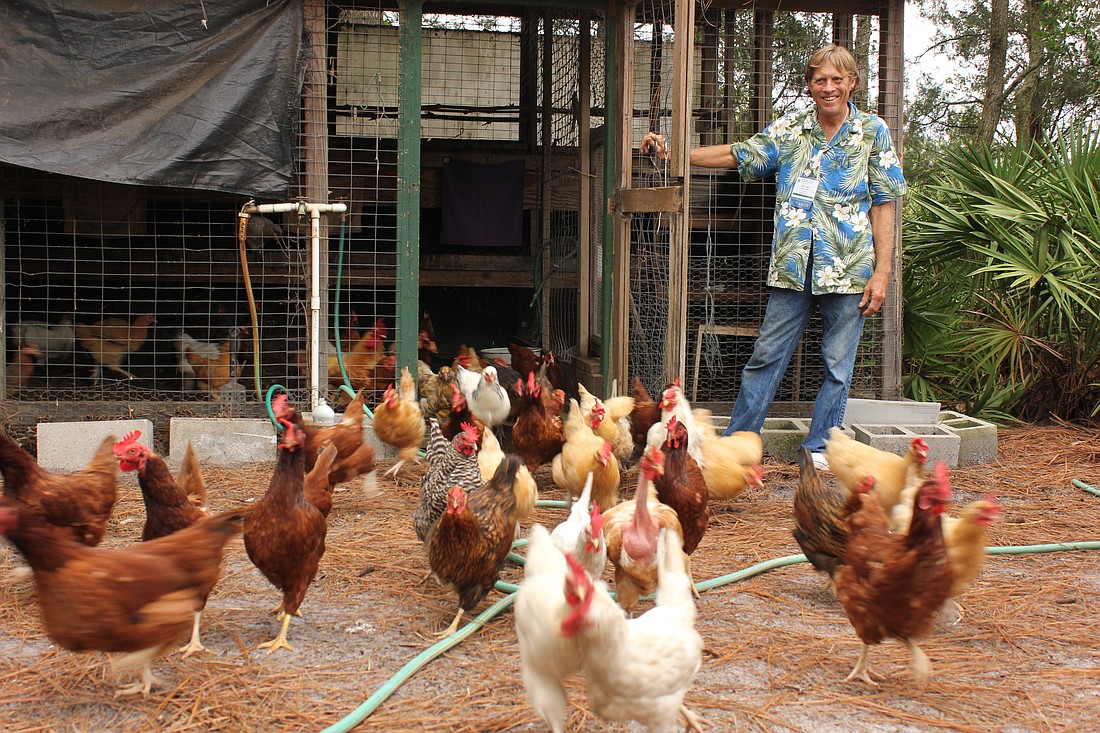- April 18, 2024
-
-
Loading

Loading

When Winter Park resident Rachel Whited hatched her plan to make a community-wide push to legalize backyard chickens, she knew she might ruffle some feathers.
Six months and 501 Winter Park Backyard Chicken Initiative petition signatures later, she’s starting to do just that.
On Aug. 31, at the Winter Park Commission meeting, Whited and a flock of supporters came together to call foul on a city law that’s been around for nearly a century. The group wants chickens to be removed from the prohibited farm animals list in city code.
“They’re useful birds, and it doesn’t make sense why we can’t have one sort of useful pet in this city,” she said, stifling a laugh.
Bernice, Lucille and Faye — the three hens Whited says she “may or may not” house in her own backyard — provide fresh eggs to her and her neighbors, valuable fertilizer for the soil, and a way to recycle food scraps. All, she says, while being considerably less bothersome than her neighbors’ dogs.
“We’re not asking for anything unreasonable,” she said. She’s proposing that the city allow residents to house up to five hens in backyard coops. Roosters — the main cause of noise concern and unnecessary for egg production — would remain on the prohibited list.
Whited’s initiative comes on the heels of a similar push for legalizing backyard chickens in the city of Orlando earlier this year. In May, the Orlando City Council passed a pilot program allowing 25 residents to house up to three chickens in their backyard. The program has since been widened slightly to allow additional families to enroll, said Dennis Mudge, the Multi-County Animal Science Agent for the University of Florida who helped organize the pilot program.
“I’m finding as I visit those in the pilot program, the neighbors are all happy to have the chickens around… it’s going very well. These are some of the best treated chickens I’ve ever seen in my life,” he said with a laugh.
The Orlando program, which requires participants to take an urban chicken care class, and the concurrent Winter Park Backyard Chicken Initiative are part of what Mudge says has been a larger nationwide “whole food” movement that’s blossomed in the last five years. People, he said, are increasingly interested in where their food is coming from and are using chickens as a way to control that on their own.
Tom Carey operates Sundew Gardens in Oviedo, where he teaches urban chicken care classes and raises nearly five-dozen chickens of his own. He says he’s seen a growing interest locally in living off the land. He says cities are hindering people’s basic right to control the source of their own food by outlawing backyard chickens.
“They’re essentially saying people can’t grow and produce their own food – they’re saying you have to go to Publix and pay for these things with cash…. For the cities to write laws that people have to buy food at a grocery store, I don’t agree with that,” he said.
He said raising hens is a centuries-old tradition that, when done responsibly, causes little or no disruption to a community.
“You might hear maybe a couple cluck, cluck, clucks, but nothing louder than a TV,” he said.
Mudge said noise and moderation of the chickens were the biggest concerns in Orlando, and have since become non-issues as the pilot program has moved along. He said other cities, from Chicago to San Francisco, have passed successful programs like Orlando’s in recent years.
“The main thing is that the birds be treated appropriately. … People were afraid that this would be taken advantage of, but it’s been just the opposite,” he said.
Winter Park resident Joseph D’Anna says he stumbled upon Whited’s Winter Park Backyard Chicken Initiative while researching the idea of urban chickens after he heard that they were legalized in Seattle. He found other cities in Florida, such as Sarasota and Tampa, had changed laws to allow backyard chickens, but that Winter Park still had the practice outlawed. But he’s hopeful that with the initiative raising awareness, it won’t be long until that changes.
“I think you’ll see more cities do it especially if it works out in Orlando,” he said. “Winter Park should watch how theirs goes, let Orlando work out the bugs — so to speak — and go from there.”
Winter Park Mayor Ken Bradley says that following Whited’s appeal to the Commission last month, city staff is researching the urban chickens and has instructed members of the Planning and Zoning Board to provide a recommendation to the Commission in the near future.
To learn more about the Winter Park Backyard Chicken Initiative, visit facebook.com/wpchickens
“We always try to be responsive to citizens requests, so that’s what we’re working to do…. The request is very interesting, and I’m sure it will have its time too,” he said.
For the time being, Whited is working to increase awareness and education about urban chickens throughout the community. From posters to Facebook posts, she said she is doing all she can to try and change the way people view the idea of raising chickens in Winter Park.
She’s says that with chickens, like dogs, there are a variety of breeds to choose from, and the birds often develop personalities and relationships with the owners like any other pet. For those interested, she said, even Williams-Sonoma on Park Avenue has a chicken coop and kit for sale in its store.
“Our biggest enemy is people’s visions of what raising backyard chickens means,” she said. “It’s a really great thing, and not necessarily what people expect.”